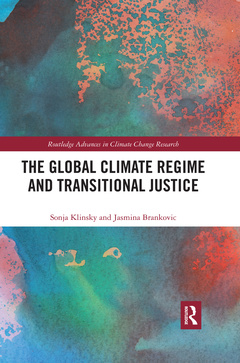Description
The Global Climate Regime and Transitional Justice
Routledge Advances in Climate Change Research Series
Authors: Klinsky Sonja, Brankovic Jasmina
Language: English
Subjects for The Global Climate Regime and Transitional Justice:
Keywords
Transitional Justice; Climate Context; Sonja Klinsky; Transitional Justice Processes; Jasmina Brankovic; Transitional Justice Contexts; Climate Change; Climate Justice; climate change governance; Transitional Justice Mechanisms; Climate Harms; Environmental studies; Fair Burden Sharing; Sophia Kalantzakos; Past Harms; climate policy; Canadian TRC; Transitional Justice Approaches; Transitional Justice Experiences; Truth Commissions; Climate Impacts; Civil Society; Global Climate Regime; Low Carbon Development; SDM; Human Rights; Climate Action; Truth Commission Process; Buen Vivir; Reparations Program; Cop President
50.12 €
In Print (Delivery period: 14 days).
Add to cartPublication date: 10-2019
· 15.6x23.4 cm · Paperback
166.30 €
In Print (Delivery period: 14 days).
Add to cartPublication date: 04-2018
· 15.6x23.4 cm · Hardback
Description
/li>Contents
/li>Readership
/li>Biography
/li>
Geopolitical changes combined with the increasing urgency of ambitious climate action have re-opened debates about justice and international climate policy. Mechanisms and insights from transitional justice have been used in over thirty countries across a range of conflicts at the interface of historical responsibility and imperatives for collective futures. However, lessons from transitional justice theory and practice have not been systematically explored in the climate context. The comparison gives rise to new ideas and strategies that help address climate change dilemmas.
This book examines the potential of transitional justice insights to inform global climate governance. It lays out core structural similarities between current global climate governance tensions and transitional justice contexts. It explores how transitional justice approaches and mechanisms could be productively applied in the climate change context. These include responsibility mechanisms such as amnesties, legal accountability measures, and truth commissions, as well as reparations and institutional reform. The book then steps beyond reformist transitional justice practice to consider more transformative approaches, and uses this to explore a wider set of possibilities for the climate context.
Each chapter presents one or more concrete proposals arrived at by using ideas from transitional justice and applying them to the justice tensions central to the global climate context. By combining these two fields the book provides a new framework through which to understand the challenges of addressing harms and strengthening collective climate action. This book will be of great interest to scholars and practitioners of climate change and transitional justice.
Acknowledgements
List of Abbreviations
List of Tables and Figures
Introduction: A Transitional Justice Approach to the Climate Change Context
Chapter One: From Climate Harms to Climate Action
Chapter Two: Classic Strategies for Managing Climate Justice Dilemmas
Chapter Three: Managing Responsibility – Amnesty, Legal Accountability, Truth Recovery
Chapter Four: Addressing Climate Harms – Strategies for Repair
Chapter Five: Institutional Reform for Future-Oriented Climate Action
Chapter Six: Transformative Approaches to Climate Justice
Conclusion: Building Solidarity across Divides
Sonja Klinsky is Assistant Professor in the School of Sustainability at Arizona State University, USA.
Jasmina Brankovic is a Senior Researcher with the Centre for the Study of Violence and Reconciliation, South Africa.
These books may interest you

Globalizing Transitional Justice 56.70 €



